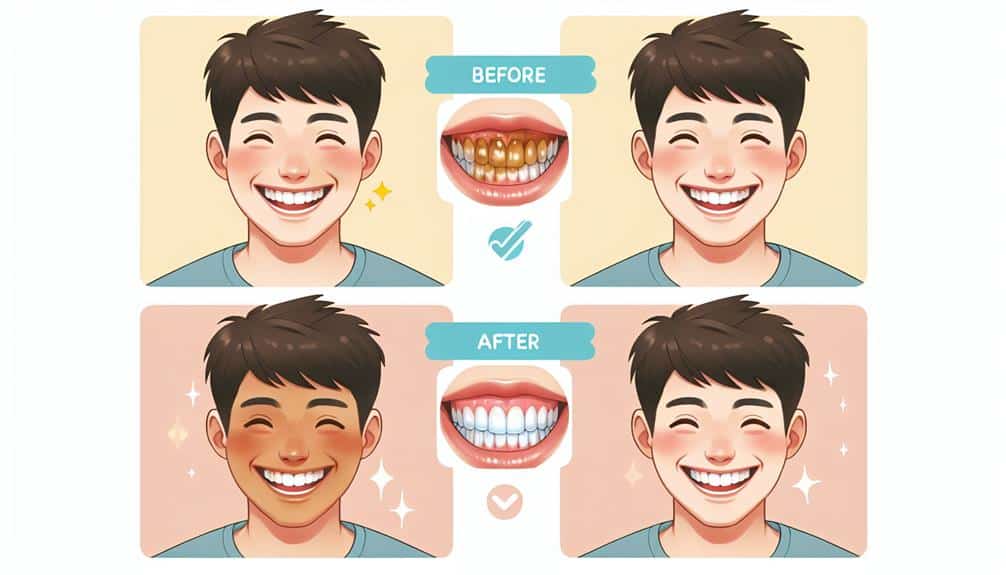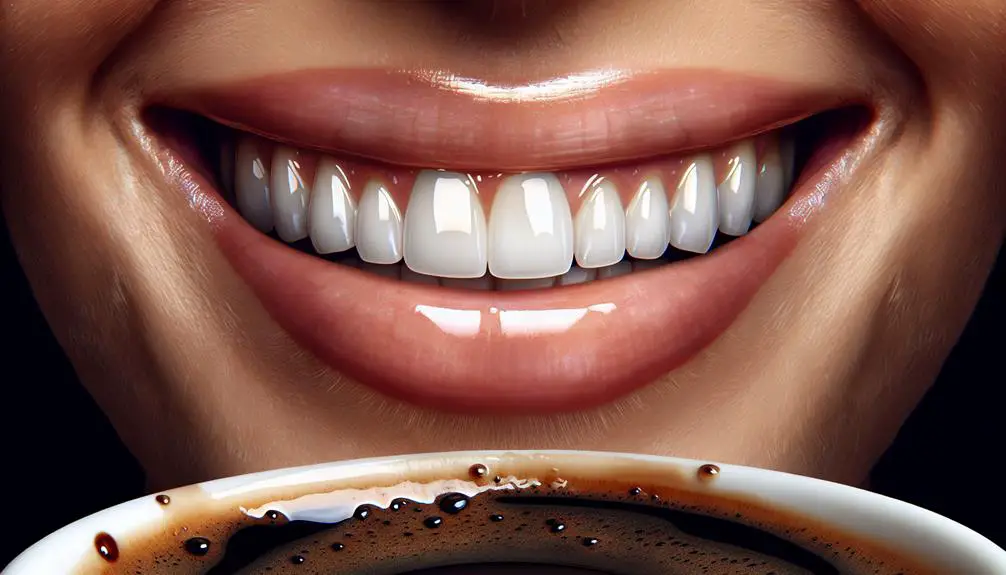Brighten your smile at home with natural remedies. Try a mix of lemon juice and baking soda to scrub away stains. Opt for coconut oil pulling, as it removes plaque and bacteria for whiter teeth. Rinse with apple cider vinegar to gently lift surface stains. Use activated charcoal sparingly to adsorb discoloration. Rub strawberries and baking soda for a gentle exfoliation. These proven methods can help combat coffee-stained teeth effectively.
Key Points
- Lemon juice and baking soda mixture breaks down coffee stains on teeth.
- Coconut oil pulling removes bacteria and stains, aiding in teeth whitening.
- Apple cider vinegar rinse gently removes surface stains with acetic acid.
- Activated charcoal paste binds to stains, brightening teeth when used appropriately.
- Strawberries and baking soda rub gently exfoliate and remove coffee stains for a brighter smile.
Lemon Juice and Baking Soda
To effectively whiten coffee-stained teeth using a natural remedy, combine lemon juice and baking soda for a gentle yet powerful solution. Lemon juice, with its citric acid, acts as a natural bleaching agent that can help lighten stains on the teeth. The acidity in lemon juice helps to break down the compounds that cause discoloration, making it a useful ingredient in teeth whitening. Baking soda, on the other hand, works as a mild abrasive that can scrub away surface stains on the teeth without causing damage to the enamel.
When these two natural remedies are combined, they create a potent mixture that can help whiten coffee-stained teeth. To use this remedy, mix a small amount of lemon juice with baking soda to form a paste. Gently apply the paste to your teeth using a toothbrush or your finger, making sure to cover all stained areas. Leave the mixture on for about a minute before rinsing thoroughly. Please be aware that while this method can be effective in teeth whitening, it should be used sparingly to avoid damaging the enamel due to the acidic nature of lemon juice.
Coconut Oil Pulling
For further natural teeth whitening options beyond lemon juice and baking soda, consider the practice of coconut oil pulling to help combat coffee stains. Oil pulling, an ancient Ayurvedic technique, involves swishing oil around in your mouth to remove bacteria, plaque, and stains from teeth. Coconut oil is particularly popular for this practice due to its pleasant taste and potential health benefits.
Oil pulling with coconut oil can benefit teeth whitening techniques by reducing the presence of bacteria in the mouth, which can contribute to staining. The lauric acid in coconut oil has antimicrobial properties that may help improve oral health. Additionally, the swishing action during oil pulling can help dislodge plaque and debris from the teeth, leading to a cleaner and brighter smile over time.
To incorporate coconut oil pulling into your oral hygiene routine, simply take a tablespoon of coconut oil, swish it around in your mouth for 15-20 minutes, then spit it out and brush your teeth as usual. Repeat this process a few times a week for potential teeth whitening benefits.
Apple Cider Vinegar Rinse
Consider incorporating an apple cider vinegar rinse into your oral care routine for potential teeth whitening benefits. Apple cider vinegar is a natural product that may help whiten teeth due to its acetic acid content, which has been shown to have some whitening effects.
Here are some key points to keep in mind when using apple cider vinegar for oral hygiene:
- Gentle Whitening: Apple cider vinegar may gently remove surface stains on teeth, leading to a brighter smile over time.
- Acidic Nature: Due to its acidic nature, it's essential to dilute apple cider vinegar with water before use to prevent damage to tooth enamel.
- Consistency is Key: For best results, incorporate apple cider vinegar rinses into your dental care routine a few times a week, alongside regular brushing and flossing.
Activated Charcoal Paste
When looking to enhance the whitening effects on coffee-stained teeth, exploring the use of Activated Charcoal Paste can be a beneficial option to explore. Activated charcoal is a natural remedy known for its ability to bind to toxins and stains, making it a popular choice for teeth whitening.
To create an activated charcoal paste, mix a small amount of activated charcoal powder with water to form a paste-like consistency. Gently brush this paste onto your teeth, allowing it to sit for a few minutes before rinsing thoroughly.
Activated charcoal works by adsorbing surface stains on the teeth, helping to remove discoloration and brighten your smile. While this method can be effective in whitening coffee-stained teeth, it's essential to use it sparingly to prevent excessive abrasion on the enamel.
Incorporating activated charcoal paste into your oral care routine once or twice a week can help maintain a brighter smile. Remember to brush with regular toothpaste afterward to remove any charcoal residue and maintain good oral hygiene.
Strawberries and Baking Soda Rub
To naturally help whiten coffee-stained teeth, try a gentle rub of strawberries and baking soda paste. Strawberries aren't only delicious fruits but also contain fruit enzymes that can help break down stains on teeth. When combined with baking soda, which provides natural exfoliation, this mixture can be effective in removing surface stains and brightening your smile.
Here are some reasons why this home remedy might be worth a try:
- Gentle yet effective: The combination of strawberries and baking soda offers a gentle way to remove stains without being harsh on your enamel.
- Affordable and accessible: Both strawberries and baking soda are commonly found in households, making this remedy convenient and cost-effective.
- Natural solution: By utilizing fruit enzymes and natural exfoliation properties, this method avoids the use of harsh chemicals often found in commercial whitening products.
Frequently Asked Questions
Can I Use These Home Remedies if I Have Sensitive Teeth?
If you have sensitive teeth, it's imperative to be cautious when using home remedies for whitening. Consider options like coconut oil pulling or baking soda sparingly. Prioritize sensitivity relief and prevention through gentle oral care practices.
How Often Should I Use These Methods to See Results?
For best results, apply these methods consistently. Overuse can harm enamel, so moderation is key. Long-term, expect gradual improvement. Balance is essential – too much can hinder progress, but regular use yields lasting changes.
Are There Any Risks or Side Effects Associated With Using These Natural Remedies?
To guarantee safety, consult dental checkups regularly and take necessary precautions when using natural remedies. Research ingredient safety and proper application techniques. Stay informed about potential risks and side effects to maintain peak oral health.
Can These Remedies Be Used in Conjunction With Professional Teeth Whitening Treatments?
Blending natural remedies with professional teeth whitening treatments can improve effectiveness. It's important to seek a professional opinion before using both simultaneously to avoid potential risks. Follow recommended usage restrictions for best results and safety.
How Long Do the Effects of These Home Remedies Last?
Maintaining the effects of home remedies for whitening coffee-stained teeth requires a consistent maintenance routine. Long term effectiveness hinges on stain prevention through good oral care habits. With diligence, you can enjoy a dazzling smile!



